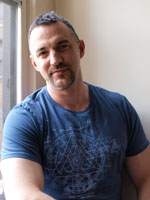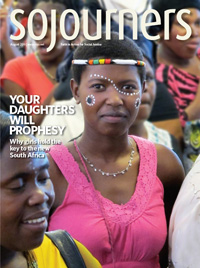Gender
[Editors' note: This post is part of a series over the last few weeks on youth homelessness. In the September/October issue of Sojourners magazine, the Ali Forney Center and the Gay and Lesbian Alliance Against Defamation (GLAAD) ran an ad to raise awareness of the serious problem of LGBT youth homelessness.]
homelessness.]
Fact 1) About 40 percent of the homeless youth in the United States identify as lesbian, gay, bisexual, or transgender.
Fact 2) One in four teens rejected by their families becomes homeless.
Fact 3) Parents who identify as strongly religious are three times more likely to reject their children.
Yet for Carl Siciliano, founder and president of the Ali Forney Center, these aren't just facts -- they are his daily life.
The first few nights weren't so bad. It was on the fourth night, the night it rained, that it got to me. I had just spent the past week sleeping on the sidewalk in front of the Illinois state Capitol building in Springfield. Throughout the week, young people of faith, college students, as well as homeless and formerly homeless youth traveled from Chicago to Springfield. Some slept on the sidewalks at night, and others came solely to lobby their legislators. We were all there for the same reason -- because each year nearly 25,000 youth experience homelessness in the state of Illinois. Not only were there not the resources to help these youth, but most legislators and most of the general public didn't even realize the problem existed.
In the past few weeks, I've written about a lot of full-page ads. This full-page ad is different. Too often, homeless youth have been invisible. The Ali Forney Center, a service provider for LGBT homeless youth, has a full-page ad in this month's issue of Sojourners magazine. GLAAD, the Gay and Lesbian Association Against Defamation, connected the Ali Forney Center to Sojourners, as a part of an advertising campaign the Ali Forney Center is running. The ad highlights that up to 40 percent of homeless youth identify as lesbian, gay, bisexual, or transgender. I have talked with many teens who became homeless because they were kicked out of their homes or ran away from abuse by their parents because of their sexual identity. After their homes became dangerous, they went to the streets, where many were attacked and some were trafficked or forced into prostitution.
Over the past few weeks various news outlets have run stories on the so-called feminism of Sarah Palin and Michele Bachmann. Typical of the media, in order to make that claim, they, of course, had to assume that any woman doing anything in public equals some sort of feminist revolution. It is, however, a rapidly spreading idea. If the concept of successful women must be blamed on feminist action, then successful conservative women must be the result of feminism as well. Granted this new definition of "feminist" is, as Lisa Miller wrote for the Washington Post, "a fiscally conservative, pro-life butt-kicker in public, a cooperative helpmate at home, and a Christian wife and mother, above all." But apparently it's still feminism.
While many from the left were outraged by the idea of associating these arch-conservatives, who stand against many of the things historical feminists have supported, with feminism, others supported the idea. Naomi Wolf, who seems to have a love/hate relationship with feminism, wrote that the problem some have with calling those women feminists is that we don't understand the history of feminism. She argues (rightly in my opinion) that feminism has only become associated with leftist agendas since the 1960's, but was, in its origins, more balanced and open to conservative values. But then she explains her reasoning why:
Lean and lanky, the 30-something teacher probed the congregation with a practiced eye as he wound down his presentation. Ezekiel, or "Zeke" (pseudonym), teaches at a secondary school in another country. Backed up by a carefully constructed PowerPoint presentation, Ezekiel shared his passion for sensitively pouring truth and grace into the lives of his students, particularly the girls. His blue eyes blazed as he asked if a woman in the Community Christian Church (not its real name) congregation would be willing to come forward and pray for the women of his host country.
No one moved.
More than 150 Roman Catholic priests in the United States have signed a statement in support of a fellow cleric Roy Bourgeois, who faces dismissal for participating in a ceremony ordaining a woman as a Catholic priest, in defiance of church teaching.
More than 300 priests and deacons in Austria -- representing 15 percent of Catholic clerics in that country -- last month issued a "Call to Disobedience," which stunned their bishops with a seven-point pledge that includes actively promoting priesthood for women and married men, and reciting a public prayer for "church reform" in every Mass.
 The lost art of reading might be in danger, but I'm happy to report that the desire to write remains strong, at least with Amazw'Entombi ("Voices of the Girls").
The lost art of reading might be in danger, but I'm happy to report that the desire to write remains strong, at least with Amazw'Entombi ("Voices of the Girls").
This creative writing club in Gugulethu, a township 10 miles outside Cape Town, South Africa, drew together nearly two dozen expressive girls, ages 13 through 20, each week for a year. With the help of a prompt -- a phrase or a short piece of writing to get started -- together the girls and I wrote. Like athletes in training, we built up from an initial three minutes of writing to, eventually, 20 minutes and sometimes longer when they asked for more time. Then we would go around the circle where we sat and read aloud what each of us wrote.
One week, the girls collectively wrote their manifesto (below), and staged a reading when the Flip camera came out. Then Sharon added her own contribution, "Proudly South African" (to hear her read, click here). She's now enrolled in her first year studying psychology at the University of Cape Town. I'm secretly hoping she switches to journalism.
Our current practice in the U.S. actually reflects the earlier legal reality of coverture: In the process of the "two becoming one flesh," the wife lost her rights to property, legal representation in court, and even her public identity as her husband became the sole representative for the family. This combination of identities (or, rather, the wife becoming lost in her husband's identity) led to wives taking their husbands' last names. For me, losing my surname would have represented silent assent to this oppressive practice.
What is wrong with the typical photo of world leaders making decisions for their countries? The general absence of women -- at the table, in the room, and, as a result, from the agenda.
In one of my last blog posts on God's Politics, I had some pretty strong opinions on the negative comments made by Bernard Hopkins about Donovan McNabb implying that McN
Today is my one-year anniversary on vitamin L, and it's finally time to talk about.
I struggle with anxiety and clinical depression, and I take vitamin L -- or Lexapro to be exact -- to treat it. It's been one year since I decided enough was enough. I was tired of being tired. Tired of being sad. Tired of always feeling on edge about almost anything.
Last spring I finally sought out the help I needed all along, and took some concrete steps in overcoming depression and the cultural stigma mental health issues carry within the Asian American, American, and Christian cultures. And that is where I find convergence, because May is Asian Pacific American Heritage Month, and it is also Mental Health Awareness Month. I couldn't have orchestrated it better myself.
Some controversy has arisen about an ad campaign that a new coalition wanted to run in Sojourners on the issue of the LGBTQ community and the church. We chose not to run the ad as this is an issue we want to openly discuss on and through our editorial pages and not through our ad space. Like the larger church, Sojourners' constituency, board, and staff are not of one mind on all of these issues. However, we at Sojourners seek to foster honest, fair, and loving dialogue among Christians. LGBTQ issues may not be our primary calling as our work against poverty and hunger, and for peace, but based on some reactions to our decision, I want to use this as an opportunity to clarify the positions and practices of Sojourners on this important discussion on the life of the church in the early 21st centur